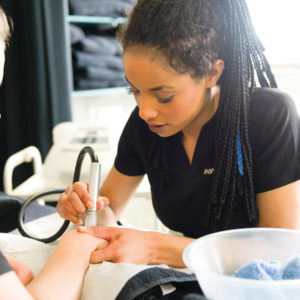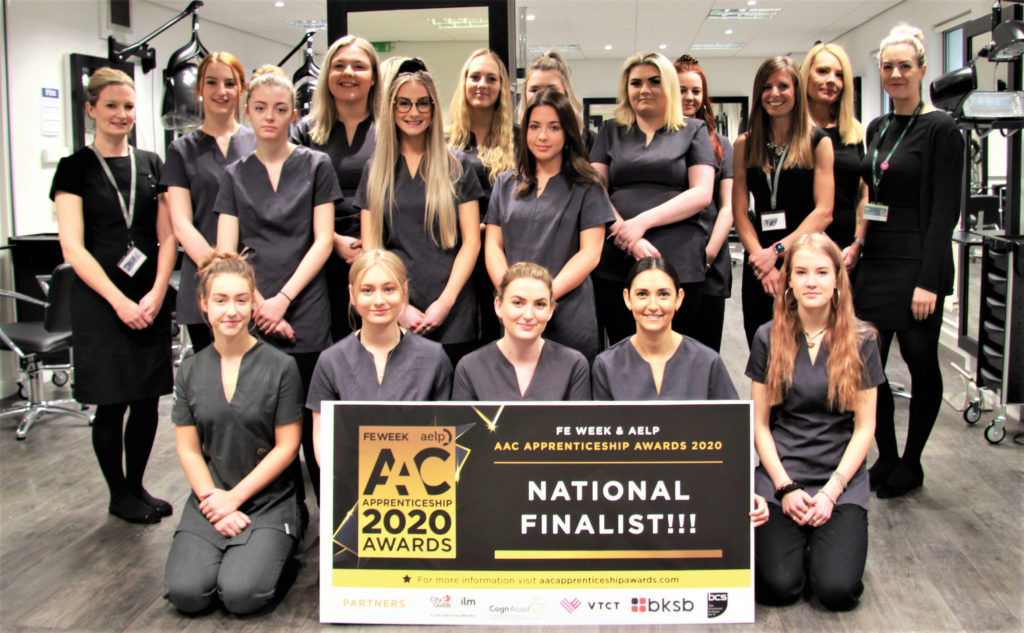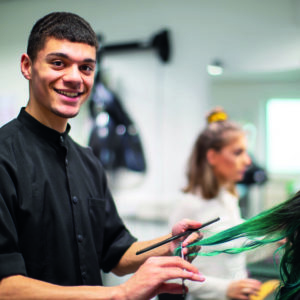 Hayley McKinstry, Quality Development Manager at Truro and Penwith College, sees an excellent learner experience as the key to running a successful apprenticeship programme. This means ensuring that both employers and college staff are fully equipped to boost each and every learner’s attainment. She says, “The learner experience is at the heart of everything that we do. The well-resourced salons reflect industry standard salons. We have a flexible delivery model with a variety of start dates throughout the year to suit both learners and employers. Our staff are very experienced and participate in continual high-quality CPD to ensure that they maintain and build their skills.”
Hayley McKinstry, Quality Development Manager at Truro and Penwith College, sees an excellent learner experience as the key to running a successful apprenticeship programme. This means ensuring that both employers and college staff are fully equipped to boost each and every learner’s attainment. She says, “The learner experience is at the heart of everything that we do. The well-resourced salons reflect industry standard salons. We have a flexible delivery model with a variety of start dates throughout the year to suit both learners and employers. Our staff are very experienced and participate in continual high-quality CPD to ensure that they maintain and build their skills.”
Hayley’s passion for the industry has been with her from a young age. Starting 30 years ago, Hayley embarked on full-time study to attain a Level 2 and a Level 3 Beauty Therapy qualification before landing a role at Centre Parcs as a Beauty Therapist. By chance, she was asked to provide cover for some practical Level 2 Beauty Therapy classes, and from there, her love for education began. This led her to help launch Beauty Therapy apprenticeships at the college where she was working at the time. She says, “This was such an exciting opportunity, to be part of something that could enhance the way that Beauty Therapy was taught.” She now utilises her vast knowledge and experience to develop and deliver innovative, high-quality qualifications at Truro and Penwith College.
 2020 AAC Hair and Beauty Provider of the Year award winners, Truro and Penwith College, have been developing and delivering apprenticeships for over 10 years. They currently offer Level 2 and 3 Hairdressing and Beauty Therapy Apprenticeships, as well as a Level 3 Nail Apprenticeship.
2020 AAC Hair and Beauty Provider of the Year award winners, Truro and Penwith College, have been developing and delivering apprenticeships for over 10 years. They currently offer Level 2 and 3 Hairdressing and Beauty Therapy Apprenticeships, as well as a Level 3 Nail Apprenticeship.
For apprenticeships, the relationship between training provider and employer has never been more important, with the phasing out of the old Apprenticeship Frameworks and the New Apprenticeship Standards becoming the gold-standard apprenticeship model. Truro and Penwith College champion effective communication and dialogue with employers to ensure that the needs of the learner are fully met to ultimately produce high-calibre professionals.
Each term, they facilitate an employer forum that welcomes employers to review and develop programmes of education alongside the college, as well as actively encouraging employers to participate and gain in-depth knowledge in training and course delivery. Hayley says, “Employers must have full understanding of the entire process of the apprenticeship. It is vital that they understand all of the stages and what they mean. They must know how to contribute to the development of the apprentices and that they are responsible for agreeing that the individual is ready to go the Gateway”, She adds, “A Truro and Penwith training advisor works with the employer/manager to continue to develop the apprentice within the salon, providing tasks and training that can be counted towards their 20% off-the-job training.”
 So, what does it take for a learner to undertake an apprenticeship? According to Hayley, one word–passion. “The training provider and employer will impart all of the skills, techniques and knowledge that the learner needs but they have to be engaged to get the best out of the course.” She continues, “If someone wants to be an apprentice, they must have a passion for the industry and be mature enough to take on the responsibility of full-time employment. It is vital that they fit into the salon environment and that they make sure that the objectives of the salon fit into the career pathway that the apprentice wants to achieve.”
So, what does it take for a learner to undertake an apprenticeship? According to Hayley, one word–passion. “The training provider and employer will impart all of the skills, techniques and knowledge that the learner needs but they have to be engaged to get the best out of the course.” She continues, “If someone wants to be an apprentice, they must have a passion for the industry and be mature enough to take on the responsibility of full-time employment. It is vital that they fit into the salon environment and that they make sure that the objectives of the salon fit into the career pathway that the apprentice wants to achieve.”